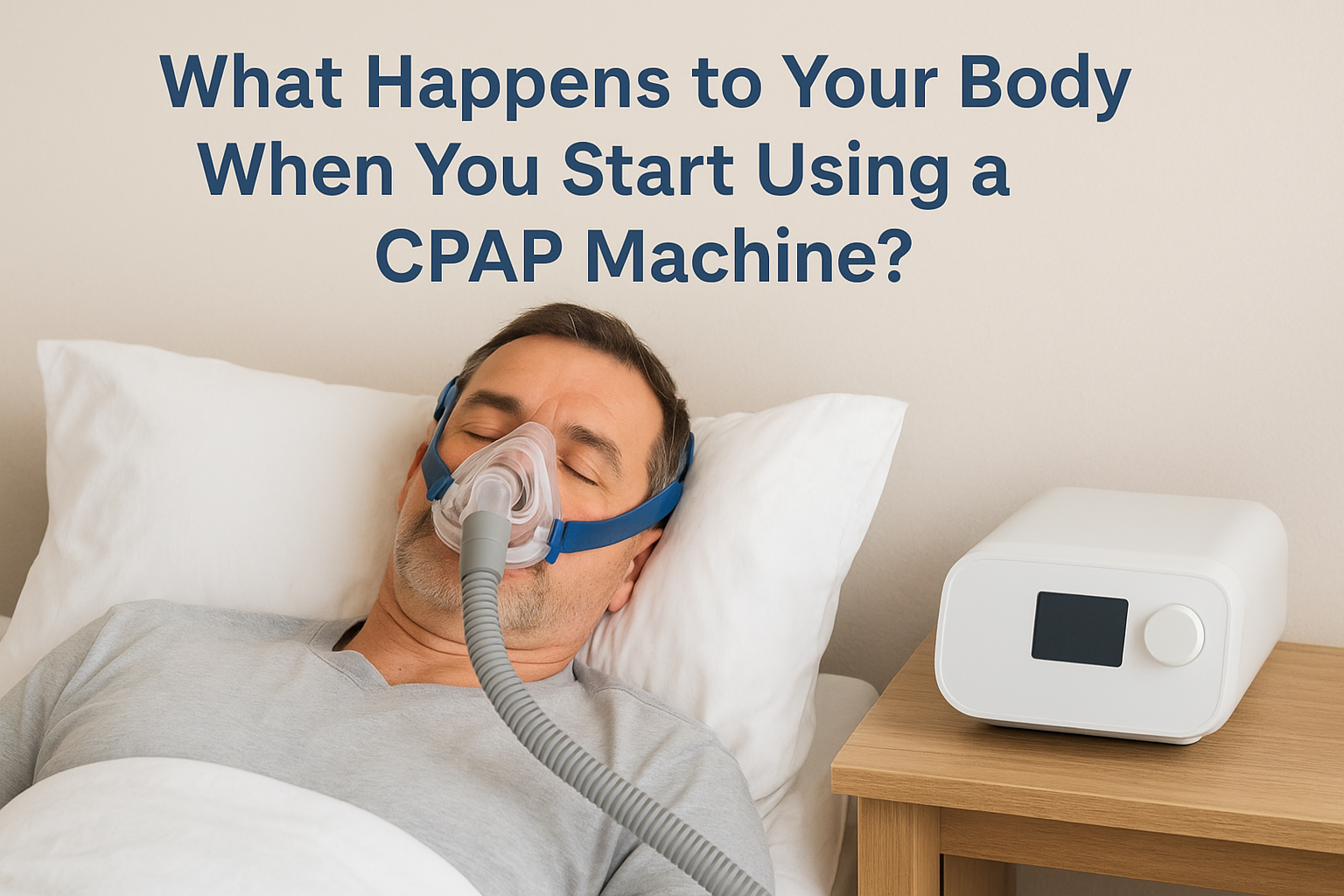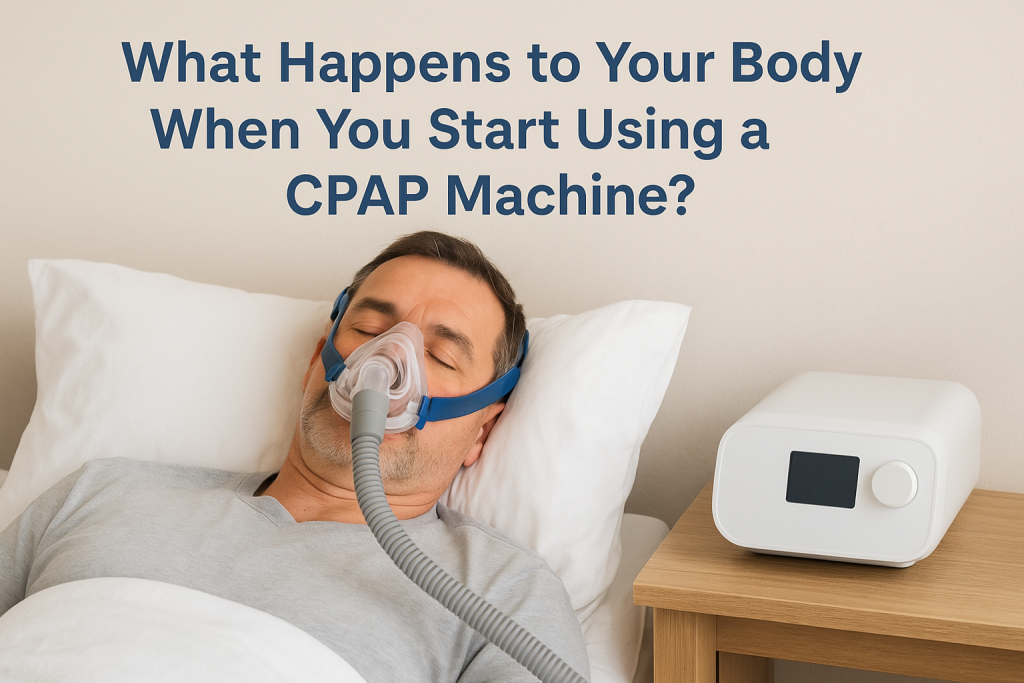What Happens to Your Body When You Start Using a CPAP Machine?


Introduction: Understanding CPAP Therapy
If you’ve been diagnosed with sleep apnea, your doctor might recommend a CPAP machine. At first, the thought of wearing a mask every night can feel overwhelming. But here’s the good news: CPAP (Continuous Positive Airway Pressure) therapy doesn’t just improve your sleep—it can transform your entire health. Understanding what happens to your body when you start using a CPAP machine can help you embrace the process with confidence.
How CPAP Machines Work
The Science Behind Continuous Positive Airway Pressure
A CPAP machine works by delivering a steady stream of air through a mask, keeping your airway open while you sleep. This prevents pauses in breathing (apneas) and ensures your body gets enough oxygen throughout the night.
Who Needs a CPAP Machine?
CPAP therapy is primarily prescribed for people with obstructive sleep apnea (OSA), a condition where the throat muscles relax too much during sleep, blocking airflow. It’s also recommended for individuals with certain heart conditions, respiratory issues, or chronic snoring.
Immediate Changes in Your Body After Starting CPAP
Improved Breathing and Oxygen Levels
One of the first changes you’ll notice is easier breathing at night. With steady airflow, oxygen levels in your blood rise, reducing strain on your heart and lungs.
Reduction in Snoring and Sleep Interruptions
Snoring often disappears once you start CPAP therapy. Your partner will likely thank you for quieter nights, and you’ll wake up feeling more rested.
Better Sleep Quality
No more waking up gasping for air or tossing and turning. CPAP machines promote uninterrupted sleep cycles, allowing your body to enter deep, restorative sleep.
Short-Term Physical Effects of CPAP Use
Increased Energy Levels During the Day
After just a few nights, many patients report feeling more alert and energized during the day. That “brain fog” often linked to poor sleep begins to lift.
Lower Morning Headaches
Morning headaches caused by oxygen deprivation and carbon dioxide buildup typically fade once CPAP therapy starts.
Stabilized Blood Pressure
Sleep apnea contributes to high blood pressure. By normalizing breathing, CPAP therapy helps stabilize blood pressure, reducing cardiovascular risks.
Long-Term Health Benefits of CPAP Therapy
Reduced Risk of Cardiovascular Diseases
Untreated sleep apnea stresses the heart, increasing the risk of heart attack, stroke, and arrhythmias. CPAP significantly reduces these risks over time.
Enhanced Brain Function and Memory
Restorative sleep improves focus, memory, and cognitive performance. Studies show CPAP users often regain sharper thinking skills.
Improved Metabolism and Weight Control
Better sleep regulates hormones like leptin and ghrelin, which control appetite. This makes it easier to manage weight.
Stronger Immune System
When your body gets quality sleep, it repairs and strengthens your immune defenses. CPAP users report fewer colds and infections.
Possible Side Effects When You First Start CPAP
Nasal Congestion and Dryness
The airflow can cause nasal dryness or congestion. Humidifiers built into CPAP machines often solve this issue.
Skin Irritation from the Mask
Masks may leave red marks or cause irritation, but switching mask styles or adjusting the fit usually helps.
Difficulty Adjusting to Air Pressure
Some patients struggle with the sensation of continuous airflow. Modern CPAP machines offer ramp features that gradually increase pressure for comfort.
Tips for Adjusting to CPAP Therapy Smoothly
Choosing the Right Mask
Full-face, nasal, or nasal pillow masks are available. Finding the right fit is crucial for comfort and effectiveness.
Using Humidifiers and Filters
Integrated humidifiers and high-quality filters improve airflow comfort and reduce irritation.
Establishing a Sleep Routine
Going to bed at the same time each night helps your body adapt to CPAP therapy faster.
Lifestyle Improvements with CPAP Therapy
Restored Relationships and Social Life
Your partner will notice the difference, and you’ll feel more energized for social activities, family time, and work performance.
Boost in Mental Health and Emotional Wellbeing
Better sleep reduces anxiety, depression, and mood swings. Many CPAP users report an overall improvement in happiness.
Expert Opinions and Medical Research on CPAP
Doctors and sleep specialists agree that CPAP remains the gold standard treatment for sleep apnea. Studies published by the American Academy of Sleep Medicine (AASM) confirm that consistent use lowers cardiovascular risks and improves overall health outcomes.
Frequently Asked Questions (FAQs)
1. How long does it take to feel the benefits of CPAP?
Most people notice improvements within a few days, but for others, it may take a few weeks.
2. Can CPAP therapy help with weight loss?
Indirectly, yes. By improving sleep quality, it balances appetite hormones, making weight management easier.
3. Will CPAP cure my sleep apnea permanently?
No, CPAP manages symptoms but does not cure sleep apnea. Continuous use is required.
4. What if I can’t tolerate the CPAP mask?
Different mask styles are available. Working with your doctor can help you find the most comfortable option.
5. Are there alternatives to CPAP machines?
Yes—oral appliances, positional therapy, and surgery may be alternatives for certain patients.
6. Is CPAP therapy safe to use long-term?
Yes. CPAP is safe and highly effective when used consistently.
Conclusion: A Healthier Future with CPAP Therapy
Starting CPAP therapy might feel like a big change, but the benefits are life-changing. From restoring energy and improving brain function to lowering cardiovascular risks, CPAP helps your body recover from years of poor sleep. With patience and consistency, you’ll find that using a CPAP machine is not just about sleeping better—it’s about living better.
👉 Learn more about CPAP and sleep health from the American Sleep Apnea Association.
















